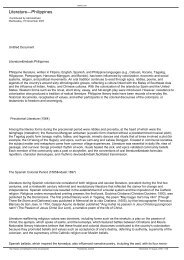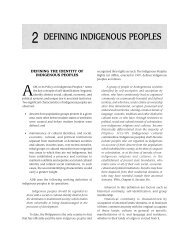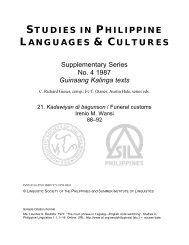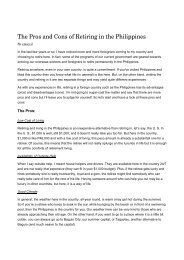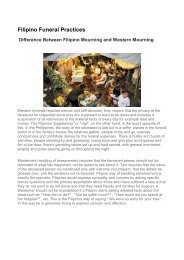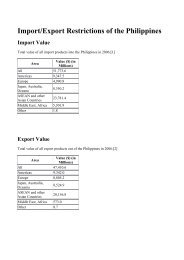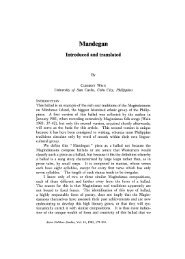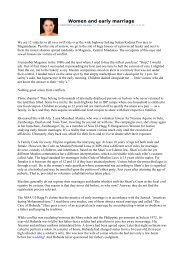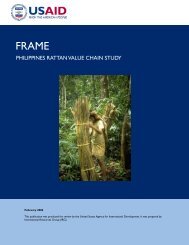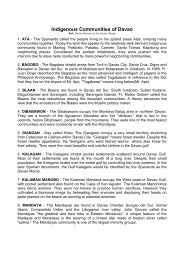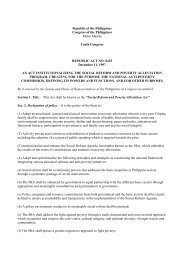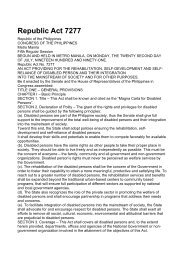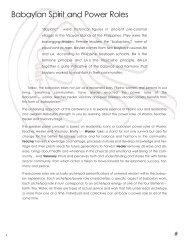The Philippine Shari'a Courts: Courts for Muslim - Muslim Mindanao
The Philippine Shari'a Courts: Courts for Muslim - Muslim Mindanao
The Philippine Shari'a Courts: Courts for Muslim - Muslim Mindanao
Create successful ePaper yourself
Turn your PDF publications into a flip-book with our unique Google optimized e-Paper software.
<strong>The</strong> <strong>Philippine</strong> Shari’a <strong>Courts</strong>: <strong>Courts</strong> <strong>for</strong> <strong>Muslim</strong> 1
Produced under the “Project: Development of a Comprehensive IEC Plan <strong>for</strong><br />
the Shari’a Justice System” funded by <strong>The</strong> Asia Foundation, Grant No. 30394-26-<br />
330-26-29804.<br />
ASIAN INSTITUTE OF JOURNALISM AND COMMUNICATION<br />
Unit 902, Annapolis Wilshire Plaza, 11 Annapolis Street<br />
Greenhills, San Juan City, <strong>Philippine</strong>s<br />
Tel. Nos. (632) 724-4564, 727-6799<br />
Website: www.aijc.com.ph<br />
Email address: info@aijc.com.ph<br />
AIJC Project Team<br />
RAMON R. TUAZON<br />
Project Team Leader<br />
ANN LOURDES C. LOPEZ<br />
Project Manager<br />
CONCHITA G. BIGORNIA<br />
Media Specialist<br />
SAMIRA GUTOC-TOMAWIS<br />
Senior Writer-Researcher<br />
LOREGENE M. MACAPUGAY<br />
Project Assistant<br />
RODANTE M. PANGAN<br />
Finance Officer<br />
Cover design and layout: MA. IMELDA E. SAMSON<br />
Illustrations: NEIL DOLORICON<br />
This <strong>Courts</strong> <strong>for</strong> <strong>Muslim</strong>s: A Primer on the <strong>Philippine</strong> Shari’a <strong>Courts</strong> was made<br />
possible with support provided by <strong>The</strong> Asia Foundation and the U.S. Agency <strong>for</strong><br />
International Development under the terms of Award No. 492-G-00-98-00032-00.<br />
<strong>The</strong> opinions expressed here are those of the authors and do not necessarily reflect<br />
the views of <strong>The</strong> Asia Foundation or the U.S. Agency <strong>for</strong> International Development.<br />
2 <strong>The</strong> <strong>Philippine</strong> Shari’a <strong>Courts</strong>: <strong>Courts</strong> <strong>for</strong> <strong>Muslim</strong>
<strong>Courts</strong> <strong>for</strong> <strong>Muslim</strong>s<br />
A Primer on <strong>The</strong> <strong>Philippine</strong> Shari’a <strong>Courts</strong><br />
What are Shari’a courts<br />
Shari’a courts are Shari’a<br />
District <strong>Courts</strong> (SDCs) and<br />
Shari’a Circuit <strong>Courts</strong> (SCCs)<br />
that were created in 1977<br />
through Presidential Decree<br />
1083, which is also known as<br />
the Code of <strong>Muslim</strong> Personal<br />
Laws. <strong>The</strong>se courts have been established to resolve cases involving <strong>Muslim</strong>s.<br />
For what offenses can I be liable in Shari’a courts under the Code of <strong>Muslim</strong><br />
Personal Laws<br />
• Illegal solemnization of marriage<br />
• Marriage be<strong>for</strong>e expiration of ‘idda (waiting period <strong>for</strong> a woman)<br />
• Offenses relative to subsequent marriage, divorce and revocation of<br />
divorce<br />
• Failure to report <strong>for</strong> registration<br />
• Neglect of duty by registrars<br />
Are Shari’a courts part of the <strong>Philippine</strong> judicial system<br />
Yes. Shari’a courts, which were created specifically <strong>for</strong> the effective administration<br />
and en<strong>for</strong>cement of the Code of <strong>Muslim</strong> Personal Laws, are subject to the<br />
administrative supervision of the Supreme Court.<br />
<strong>The</strong> <strong>Philippine</strong> Shari’a <strong>Courts</strong>: <strong>Courts</strong> <strong>for</strong> <strong>Muslim</strong> 3
SHARI’A DISTRICT<br />
COURTS<br />
What are Shari’a District <strong>Courts</strong><br />
Shari’a District <strong>Courts</strong> are courts<br />
where <strong>Muslim</strong>s can file the following cases:<br />
1. Those which fall within the original<br />
jurisdiction of Shari’a District <strong>Courts</strong><br />
(Article 143, CMPL):<br />
a. All cases involving custody,<br />
guardianship, legitimacy, paternity and filiation arising<br />
under the Code of <strong>Muslim</strong> Personal Laws;<br />
b. All cases involving disposition, distribution and settlement of estate of<br />
deceased <strong>Muslim</strong>s, probate of wills, issuance of letters of administration<br />
or appointment of administrators or executors regardless of the<br />
nature or aggregate value of the property;<br />
c. Petitions <strong>for</strong> the declaration of absence and death <strong>for</strong> the cancellation<br />
or correction of entries in the <strong>Muslim</strong> Registries mentioned in Title VI,<br />
Book Two of the Code of <strong>Muslim</strong> Personal Laws;<br />
d. All actions arising from the customary contracts in which the parties<br />
are <strong>Muslim</strong>s, if they have not specified which law shall govern their<br />
relations; and<br />
e. All petitions <strong>for</strong> mandamus, prohibition, injunction, certiorari, habeas<br />
corpus, and all other auxiliary writs and processes in aid of its appellate<br />
jurisdiction.<br />
2. Those which fall within its concurrent jurisdiction with existing civil<br />
courts such as:<br />
a. Petitions by <strong>Muslim</strong> <strong>for</strong> the constitution of a family home, change of<br />
name and commitment of an insane person to an asylum;<br />
b. All other personal and legal actions not mentioned in paragraph 1 (d)<br />
wherein the parties involved are <strong>Muslim</strong>s except those <strong>for</strong> <strong>for</strong>cible<br />
4 <strong>The</strong> <strong>Philippine</strong> Shari’a <strong>Courts</strong>: <strong>Courts</strong> <strong>for</strong> <strong>Muslim</strong>
entry and unlawful detainer, which shall fall under the exclusive<br />
jurisdiction of the Municipal Circuit Court; and<br />
c. All special civic actions <strong>for</strong> interpleader or declaratory relief wherein the<br />
parties are <strong>Muslim</strong>s or the property involved belongs exclusively to<br />
<strong>Muslim</strong>s.<br />
What are the geographical areas covered by the Shari’a District <strong>Courts</strong> and where<br />
are these courts located<br />
<strong>The</strong>re are five (5) Shari’a District <strong>Courts</strong> organized on the basis of PD 1083:<br />
Shari’a District<br />
Court<br />
First Shari’a District<br />
Court<br />
Second Shari’a<br />
District Court<br />
Third Shari’a District<br />
Court<br />
Location Area Covered Judge<br />
Jolo, Sulu Province of Sulu Bensaudi I. Arabani<br />
(Acting Presiding<br />
Judge)<br />
Bongao, Tawi-tawi<br />
Zamboanga City<br />
Province of Tawitawi<br />
Provinces of<br />
Basilan,<br />
Zamboanga del<br />
Norte and Sur,<br />
and the cities of<br />
Zamboanga,<br />
Dipolog, Pagadian<br />
and Zamboanga<br />
Bensaudi I. Arabani<br />
(Acting Presiding<br />
Judge)<br />
Tibing A. Asaali<br />
(Acting Presiding<br />
Judge)<br />
Fourth Shari’a<br />
District Court<br />
Fifth Shari’a District<br />
Court<br />
Marawi City<br />
Cotabato City<br />
Provinces of<br />
Lanao del Norte<br />
and Sur, and the<br />
cities of Iligan and<br />
Marawi<br />
Provinces of<br />
Maguindanao,<br />
North Cotabato,<br />
and Sultan<br />
Kudarat and the<br />
cities of Cotabato<br />
and Kidapawan<br />
Rasad G.<br />
Balindong<br />
(Acting Presiding<br />
Judge)<br />
Rasad G.<br />
Balindong<br />
(Acting Presiding<br />
Judge)<br />
<strong>The</strong> <strong>Philippine</strong> Shari’a <strong>Courts</strong>: <strong>Courts</strong> <strong>for</strong> <strong>Muslim</strong> 5
SHARI’A CIRCUIT COURTS<br />
What are Shari’a Circuit <strong>Courts</strong><br />
Shari’a Circuit <strong>Courts</strong> are courts<br />
where <strong>Muslim</strong>s can file cases involving the<br />
following:<br />
• Offenses defined and punished<br />
under PD 1083<br />
• Disputes relating to :<br />
marriage<br />
divorce<br />
betrothal or breach of contract<br />
to marry<br />
customary dower (mahr)<br />
disposition and distribution of<br />
property upon divorce<br />
maintenance and support and<br />
consolatory gifts (mut’a)<br />
restitution of marital rights<br />
• Disputes relative to communal properties.<br />
Under each of the five judicial districts, where are the Shari’a Circuit <strong>Courts</strong><br />
located<br />
First District<br />
Location<br />
Jolo, Sulu<br />
Siasi, Sulu<br />
Parang, Sulu<br />
Maimbung, Sulu<br />
Patikul, Sulu<br />
Luuk, Sulu<br />
Judge<br />
Bensaudi A. Arabani, Jr.<br />
(Acting Presiding Judge)<br />
Nimrod I. Arabani<br />
Nurkarhati Saluppudi<br />
Sahibbil<br />
Bensaudi A. Arabani, Jr.<br />
Musar Adil Amil<br />
Remee-Raida Saipudin<br />
Tanjili<br />
6 <strong>The</strong> <strong>Philippine</strong> Shari’a <strong>Courts</strong>: <strong>Courts</strong> <strong>for</strong> <strong>Muslim</strong>
Second District<br />
Location<br />
Bongao, Tawi-Tawi<br />
Judge<br />
Marino M.B. Salapuddin<br />
Third District<br />
Location<br />
Isabela City, Basilan<br />
Pagadian City<br />
Judge<br />
Kaudri L. Jainul<br />
Uyag P. Usman<br />
Fourth District<br />
Location<br />
Tubod, Lanao del Norte<br />
Marawi City, Lanao del<br />
Norte<br />
Baloi, Lanao del Norte<br />
Iligan City, Lanao del<br />
Norte<br />
Kapatagan, Lanao del<br />
Norte<br />
Balindong, Lanao del<br />
Sur<br />
Ganassi, Lanao del Sur<br />
Judge<br />
Samsoden A. Mustapha<br />
Aboali J. Cali<br />
Aleem Abdurrahman<br />
Morrah<br />
Osop M. Ali<br />
Demasira Menor Baute<br />
Abdullah Rosuman<br />
Amanoddin<br />
Rasad Sarip Laguindab<br />
Malabang, Lanao del Sur Ameladin Masacal<br />
Alauya<br />
Lumbatan, Lanao del Ali M. Alonto<br />
Sur<br />
Tamparan, Lanao del Sammanoden Ampaso<br />
Sur<br />
Molundo, Lanao del Sur Abdulhalim L. Saumay<br />
Wao, Lanao del Sur Sirikit B. Berua<br />
<strong>The</strong> <strong>Philippine</strong> Shari’a <strong>Courts</strong>: <strong>Courts</strong> <strong>for</strong> <strong>Muslim</strong> 7
Fifth District<br />
Location<br />
Cotabato City-Sultan Kudarat,<br />
Maguindanao<br />
Dinaig, Maguindanao<br />
Parang, Maguindanao<br />
Datu Piang, Maguindanao<br />
Maganoy, Maguindanao<br />
Buluan, Maguindanao<br />
Upi, Maguindanao<br />
Tacurong, Sultan Kudarat<br />
Isulan, Sultan Kudarat<br />
Lebak, Sultan Kudarat<br />
Palimbang, Sultan Kudarat<br />
Midsayap, North Cotabato<br />
Pikit, North Cotabato<br />
Kabacan, North Cotabato<br />
Kidapawan City, North Cotabato<br />
Judge<br />
Montano K. Kalimpo<br />
Datukaka P. Camsa<br />
Casim S. Bailan<br />
Abdilah K. Nul<br />
Vacant<br />
Mutalib S. Tagtagan<br />
Sonny Boy M. Pendatun<br />
Nacio M. Mamaton<br />
Camlon Z. Maulana<br />
Esmael S. Atuan<br />
Camlon Z. Maulana (Acting<br />
Presiding Judge)<br />
Sansaluna G. Kambal<br />
Vacant<br />
Mohd. Saga Nilong Saliao<br />
Zailon L. Wahab<br />
If I live in Manila or in any other place in the <strong>Philippine</strong>s where no Shari’a courts<br />
have been organized, where can I file my case<br />
You can file your case in any of the organized Shari’a courts nearest you.<br />
SETTLING CASES AMICABLY<br />
What is the Agama Arbitration Council<br />
<strong>The</strong> Shari’a District Court or the Shari’a Circuit Court may constitute an<br />
Agama Arbitration Council to settle certain cases amicably and without <strong>for</strong>mal trial.<br />
<strong>The</strong> Council is composed of the Clerk of Court as Chairperson and a representative<br />
of each of the conflicting parties.<br />
8 <strong>The</strong> <strong>Philippine</strong> Shari’a <strong>Courts</strong>: <strong>Courts</strong> <strong>for</strong> <strong>Muslim</strong>
What cases can be heard by the Agama Arbitration Council<br />
• Dispute brought about by wife’s<br />
exercise of tafwid (when a<br />
husband has delegated to the<br />
wife the right to effect a divorce<br />
at the time of the celebration of<br />
the marriage or thereafter)<br />
• Dispute brought about by<br />
husband’s exercise of talaq<br />
(when divorce is effected by the<br />
husband in a single repudiation<br />
of his wife during her nonmenstrual<br />
period within which<br />
he has totally abstained from<br />
carnal relation with her)<br />
• Dispute brought about by husband’s intention to contract a subsequent<br />
marriage and the wife objects<br />
• Dispute arising from husband’s refusal to give consent to wife’s exercise<br />
of profession or occupation or engagement in lawful business<br />
• Dispute brought about by a commission of an offense against customary<br />
law which can be settled without <strong>for</strong>mal trial.<br />
FILING AND APPEALING CASES<br />
As a <strong>Muslim</strong>, why should I file my grievance be<strong>for</strong>e a Shari’a court<br />
No person is allowed to place the law in his/her own hands. <strong>Philippine</strong><br />
Shari’a courts embody Islamic principles of justice.<br />
<strong>Muslim</strong>s are enjoined by the Qur’an which says:<br />
O ye who believe! Obey God and obey the Apostle and those<br />
charged with authority among you. If ye differ in anything<br />
among yourselves, refer it to God and His Apostle, if ye do<br />
believe in God and the Last Day. That is the best and most<br />
suitable <strong>for</strong> final determination. (Surah 4:59)<br />
<strong>The</strong> <strong>Philippine</strong> Shari’a <strong>Courts</strong>: <strong>Courts</strong> <strong>for</strong> <strong>Muslim</strong> 9
How do I file my case<br />
All actions and proceedings in the Shari’a court shall commence by the filing<br />
of a complaint. This complaint shall be prepared at least in triplicate by the plaintiff<br />
(muddai) or his/her counsel (wakil) or by the Clerk of Court. (Sec. 1, Rules of<br />
Procedure)<br />
<strong>The</strong> complaint shall contain the following: 1. title of the case, case number<br />
assigned to it, and date of filing; 2. name and address of the plaintiff (muddai) and/<br />
or his/her counsel, and name and address of the defendant (mudda’a alayh); and 3.<br />
concise statement of the cause of action and the relief prayed <strong>for</strong>. (Sec. 2, Rules of<br />
Procedure)<br />
A complaint is deemed filed upon the payment of the docket fee.<br />
Can a non-<strong>Muslim</strong> file a case be<strong>for</strong>e a Shari’a court<br />
Yes. A non-<strong>Muslim</strong> woman married by Islamic rites to a <strong>Muslim</strong> man can file<br />
any case covered by the Code of <strong>Muslim</strong> Personal Laws be<strong>for</strong>e a Shari’a court.<br />
Can I appeal if I am not satisfied with the decision of the Shari’a court<br />
Yes, you can appeal decisions of the Shari’a Circuit Court to the Shari’a<br />
District Court. Decisions of the Shari’a District Court can be appealed to the<br />
Supreme Court on questions of law or <strong>for</strong> abuse of discretion committed by the<br />
Judge of the Shari’a District Court.<br />
REFERENCES:<br />
Alauya, Ameladin Masacal. (2005). Shariah Remedial Law Compendium. Central<br />
Professional Books.<br />
Benito, Talib Abdul Hamid. (2005). Shariah Court, Primer on its Rules of Procedures.<br />
Marawi City: <strong>Mindanao</strong> State University.<br />
Office of the Court Administrator (2007, April 16). List of Shari’a District <strong>Courts</strong><br />
and Shari’a Circuit <strong>Courts</strong>.<br />
10 <strong>The</strong> <strong>Philippine</strong> Shari’a <strong>Courts</strong>: <strong>Courts</strong> <strong>for</strong> <strong>Muslim</strong>
For more in<strong>for</strong>mation on the Shari’a courts, please contact:<br />
Office of the Department Chair<br />
SHARI’A AND ISLAMIC JURISPRUDENCE<br />
<strong>Philippine</strong> Judicial Academy<br />
Supreme Court of the <strong>Philippine</strong>s<br />
Padre Faura St., Manila<br />
Tel. No.: (63-2) 552-9524<br />
Tel/Fax: (63-2) 552-9526<br />
E-mail: philja@supremecourt.gov.ph<br />
Website: philja.supremecourt.gov.ph<br />
<strong>The</strong> <strong>Philippine</strong> Shari’a <strong>Courts</strong>: <strong>Courts</strong> <strong>for</strong> <strong>Muslim</strong> 11
12 <strong>The</strong> <strong>Philippine</strong> Shari’a <strong>Courts</strong>: <strong>Courts</strong> <strong>for</strong> <strong>Muslim</strong>



